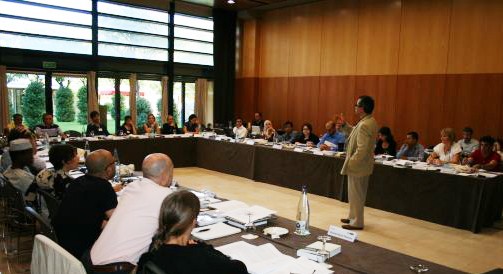Repressive regimes deliberately rewrite history and deny atrocities to legitimize themselves. Truth-seeking contributes to the creation of a historical record that prevents this kind of manipulation. It can help victims find closure by learning more about the events they suffered, such as the fate of disappeared individuals, or why certain people were targeted for abuse.
Given the complexities of reckoning with the past, truth commissions face the specific challenge of dealing with questions relating to vulnerable populations: under what conditions can truth commissions make a positive contribution to gender justice? How can they put in place a friendly process for children? Can they contribute to the rights of indigenous peoples? What are the practical and conceptual considerations facing mediators, donors, and international and national actors as they engage with truth commissions?
These are the questions being considered by participants at the Fourth Intensive Course on Truth Commissions, which began today in Barcelona. The course is presented by ICTJ in partnership with the Barcelona International Peace Resource Center (BIPRC).
Practitioners and academics representing 17 countries will participate in the week-long course, including members of the Brazilian and Ivorian Truth Commissions, the Maine Wabanaki-State Child Welfare TRC Process, and ICTJ experts from around the world. At the opening of the session, Pablo de Greiff, director of ICTJ’s Research Unit, welcomed the participants in an address on the evolution of transitional justice.
The event this year focuses on the challenge of recognizing the experiences of vulnerable populations in the work of truth commissions. Through workshops, discussions, lectures and simulations, the course provides participants with the knowledge required to conceive, implement, and engage with truth commissions in the light of best international practice and principles.
The course aims to prepare practitioners with the necessary tools to assess the propriety of creating a truth commission in the wake of protracted conflict or dictatorship, and how to ensure the design and implementation of measures are sensitive to contextual realities.
Throughout the week, the course will discuss truth-seeking as part of a comprehensive approach to address massive human rights violations, strengthen the rule of law, and contributing to sustainable peace and reconciliation in divided societies. Participants will learn how to critically appraise truth commissions as instruments to implement the rights of victims, how and why truth commissions have emerged as accountability mechanisms, and consider their potentials and limitations.
Participants will also explore the political and practical challenges around the design, implementation, and considerations that follow the conclusion of a truth commission.
